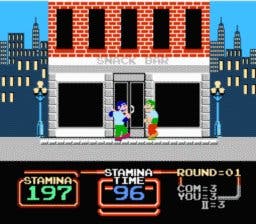Retrospective: Urban Champion
Block party.
Secondly, I'm now fascinated by the idea that, in Urban Champion, the West is seeing its culture reflected back at it. Urban Champion may have been an adaptation of Boxing for the Game & Watch, but I like to hope it was also a clumsy, if telling, lunge at the American audience. You guys like punching each other in the head outside barbers' shops, right? The dark windows of the buildings suggest recessionary Detroit, the passing cop cars belong in Chicago rather than Kyoto, and as for the neighbours who lean over second-storey sills and chuck flower pots if you're losing and confetti when you've won? That kind of thing is practically written into the US constitution.
Its thematic weirdness is actually one of the more genuinely interesting aspects about Urban Champion, in fact. It's a Nintendo game from before even Nintendo itself truly knew what a Nintendo game should be. The company had Super Mario, a Lewis Carroll-tinged platformer with smiling clouds, and was hard at work on The Legend of Zelda, an epic fantasy adventure about a cute pixie: maybe mob violence was what was missing from the portfolio. Nasty aggression aside, Urban Champion doesn't even feel very much like a Nintendo game. Movement is sluggish, the animation is horrible, knockbacks take forever, and collision detection is iffy. Its most Nintendoish flourish comes when you break off the fight to act all innocent as that cop car blasts past - and, frankly, even that isn't particularly Nintendoish.
Ultimately, though, I love this terrible game because, for a long time, I had to love it. Back in 1987, I bought Urban Champion for around £40, which was pretty much a year's worth of pocket money. (It also, given the game's limited move-set, meant that I was paying roughly £10 per punch.) For that kind of expenditure, I had to enjoy myself, particularly when there were mocking parents hovering: parents who already weren't sure about whether video games were a good thing or not.

"So this is what you guys do for fun, then?" my mum would ask uncertainly, as my sister punched me down the street. "Oh, yes," I would lie. "You probably can't tell, but there's really quite a lot of nuance to what you're watching." "Think of it like chess," my sister would chime in. "It's not about the moves, it's about predicting what your opponent's going to do, and countering it. I hear Bobby Fischer's a big fan."
I'm not sure if we were very convincing, but even that seems sort of fitting. There's something terribly self-defeating about Urban Champion - and not just because, in a game of palette swaps, you're literally punching yourself in the face most of the time. This wasn't just my first fighting game, in other words: it was my first taste of video game's peculiar take on Stockholm Syndrome. Games were there to be defended from people who didn't understand them - and the worse the games were, the more strenuous our defences became.








